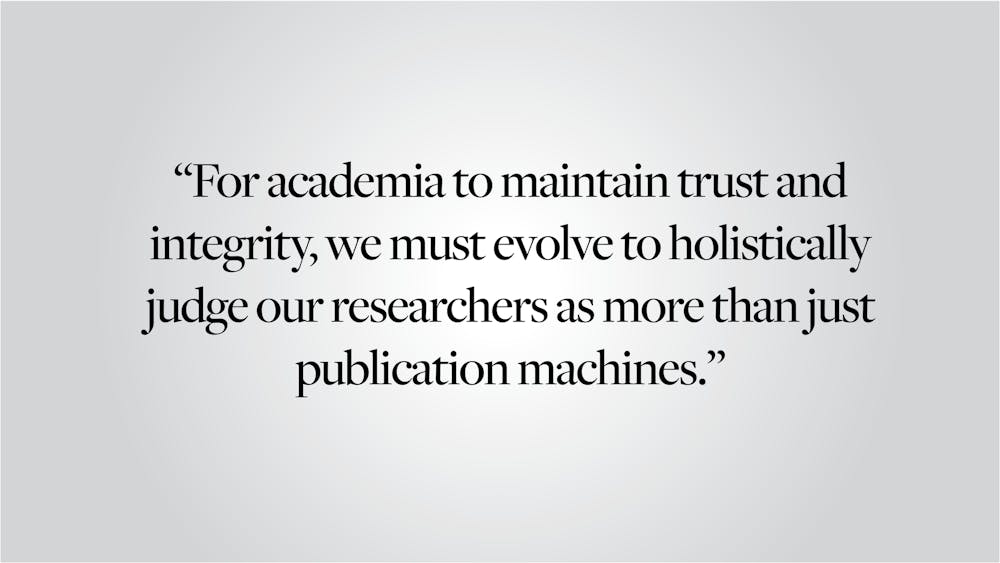Any young ambitious academic should heed this warning, as sadly, today’s academy is not what it used to be. Naturally, you might wonder, what characterizes today’s academy? Much like the rest of society, it is insatiable, and often sacrifices quality for the sake of quantity.
Ten years ago, the late Nobel Laureate Physicist Peter Higgs, the namesake of the Higgs Boson particle, said “Today I wouldn't get an academic job. I don't think I would be regarded as productive enough." He added, “It's difficult to imagine how I would ever have enough peace and quiet in the present sort of climate to do what I did in 1964.”
It is an indictment of our system of higher education if brilliant, even Nobel Prize-winning, scientists feel unable to carry out groundbreaking research because of a misalignment of incentives — and misaligned they are. Our current system has profound effects on the way we research, the way we handle burn out and the way students are taught. For academia to maintain trust and integrity, we must evolve to holistically judge our researchers as more than just publication machines.
It is often said that the currency of academia is grants and publications, and while science inherently depends on your ability to communicate results, measures of impact such as the h-index fail to hit the mark. In theory, h-indices, which give researchers a score depending on having publications that generate successively more citations, track the impact of your work. Yet in practice, it encourages gamesmanship such as self-plagiarism, publishing acceptable but poor-quality work and hyperauthorship instead of prioritizing more in-depth, high-impact articles. This can partly explain the growing divergence between h-indices and scientometrics such as receiving prestigious awards and fellowships.
But beyond that, our academic environment, where your value as a researcher depends on your ability to crank out publications, leads to cases where researchers in the sciences will often publish anything with a p-value below .05 and ignore null results, which are perceived as less impactful. This publication bias has consequences — for example, a 2015 study showed that publication bias led to an overestimation of the empirical benefits of antidepressants — this skewed literature can have an impact on treatment decisions made by medical practitioners. And by not publishing non-significant results, other researchers will inevitably repeat them.
Perceived publication pressure is often linked to questionable research practices and the reproducibility crisis. We’ve recently seen two high-profile cases of research misconduct — one from Dr. Marc Tessier-Lavigne, the former president of Stanford University, and another by Dr. Claudine Gay, the former president of Harvard University. In the case of the former, Dr. Tessier-Lavigne created a culture in which “when you didn’t please him, you didn’t get any attention,” ultimately leading junior researchers to falsify results that were ultimately irreproducible. In the case of Dr. Gay, her plagiarism is less explicable, seeming more like a case of sloppy scholarship. These citation errors were perhaps the result of a rushed writing and editing process, driven by an underlying pressure to publish. Ironically, the wife of Bill Ackman, who exposed Dr. Gay’s plagiarism to force her resignation, also plagiarized her dissertation. It is also notable that Dr. Gay’s scholarship is in the humanities, illustrating that this is not an issue confined to STEM.
But in both instances, instead of crucifying these two highly esteemed scholars, I think we ought to consider the system that fomented their sins. The pressure to publish and our whole system of valuation in academia is unsustainable. It encourages poor scholarship, burns out academics and hurts students because good teaching and mentorship play little role in your standing as a professor.
It's time to look beyond this system. Instead of focusing on raw dollars and publications as the value of an academic, we should consider student evaluations, a record of mentorship and the creativity and effort put into one’s work.
I applaud the efforts of the White House to prioritize the integrity of federally funded research but as universities, we must do more. We ought to educate our students and our faculty about the importance of good academic practices and create a culture where this is exemplified.
Two years ago, the University ambitiously announced the Operational Plan for Investing in Research which aims to double our research output and grant funding over the next five to seven years. This is a natural step— as to best serve our community, nation and the world, we ought to bring world-class research and scholarship to College Hill. But as we implement our operational plan, we must not lose sight of our core values: How we teach is just as important as the papers we publish. Our culture of collaboration and ingenuity is our strength. Finally, impactful research is measured in more than just grant dollars.
I cautiously look forward to seeing Brown become a leader not only in research and teaching, but in academic culture as well.
‘Tas Rahman ’26 can be reached at tasawwar_rahman@brown.edu. Please send responses to this opinion to letters@browndailyherald.com and other op-eds to opinions@browndailyherald.com.

Tas Rahman is a staff columnist at the Brown Daily Herald writing about issues in higher education. When he's not coding or studying biochemistry, you can find him hiking and enjoying the great outdoors.





